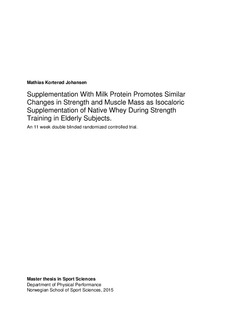| dc.contributor.author | Johansen, Mathias Korterød | |
| dc.date.accessioned | 2015-10-13T13:22:52Z | |
| dc.date.available | 2015-10-13T13:22:52Z | |
| dc.date.issued | 2015-10-13 | |
| dc.identifier.uri | http://hdl.handle.net/11250/2356112 | |
| dc.description | Masteroppgave - Norges idrettshøgskole, 2015 | nb_NO |
| dc.description.abstract | Milk protein and especially the whey fraction of milk protein have gained a lot of
interest due to its effective stimulation of postprandial muscle protein synthesis. Whey protein
can be isolated from pasteurized milk by a multi-filtration technique providing concentrated
native whey protein which contains a higher leucine content than the traditional concentrate
derived from cheese production. Leucine seems to be a key stimulator of muscle protein
synthesis, and is suggested to be even more so in elderly. This is because the optimal protein
dosage needed for stimulation of muscle protein synthesis, may be lowered with a higher
leucine content. Aim: In this study we investigated whether daily supplementation of native
whey protein could lead to larger muscle hypertrophy during 11 weeks of heavy load strength
training than an isocaloric supplementation of milk protein in elderly subjects. | nb_NO |
| dc.language.iso | eng | nb_NO |
| dc.subject | nih | nb_NO |
| dc.subject | masteroppgaver | nb_NO |
| dc.subject | styrketrening | |
| dc.subject | muskler | |
| dc.subject | proteiner | |
| dc.subject | melkesyre | |
| dc.title | Supplementation with milk protein promotes similar changes in strength and muscle mass as isocaloric supplementation of native whey during strength training in elderly subjects: an 11 week double blinded randomized controlled trial | nb_NO |
| dc.type | Master thesis | nb_NO |
| dc.description.localcode | Seksjon for fysisk prestasjonsevne / Department of Physical Performance | nb_NO |
